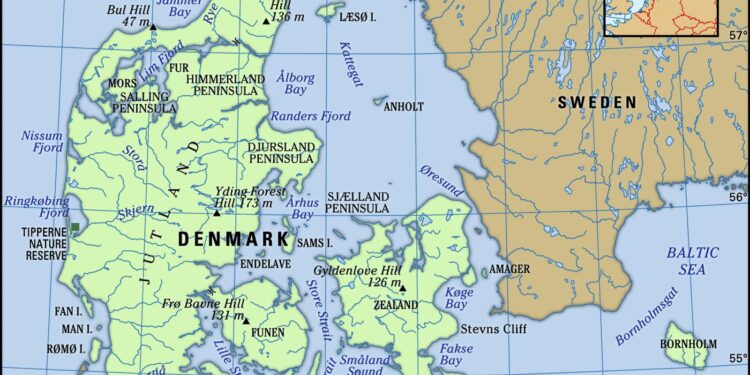Denmark has officially summoned the United States ambassador following concerns over suspected influence operations targeting Greenland, Reuters reports. The move underscores escalating apprehensions in Copenhagen about foreign interference aimed at swaying political and strategic interests in the Arctic region. As Greenland’s geopolitical significance grows amidst global competition, Denmark’s diplomatic protest highlights the complexities surrounding sovereignty and security in the High North.
Denmark Calls in US Envoy Amid Allegations of Influence Operations in Greenland
Denmark has formally summoned the United States ambassador in Copenhagen following troubling reports suggesting that US actors may be engaged in covert influence campaigns within Greenland. These operations allegedly aim to sway the island’s political landscape and resource management decisions, raising serious concerns about the sovereignty and internal affairs of the Danish territory. Officials emphasize the need for transparency and have requested a comprehensive explanation regarding the nature of these activities.
Among the primary areas of Danish concern are:
- Political lobbying targeted at Greenlandic leaders
- Undisclosed funding of local projects and organizations
- Information dissemination efforts influencing public opinion
- Potential security implications in light of Arctic geopolitics
In response, Copenhagen is pressing Washington for immediate cooperation. The dialogue underscores the delicate balance between allied cooperation and protecting national integrity amid increasing international interest in the resource-rich Arctic region.
| Concern Area | Potential Impact |
|---|---|
| Political Lobbying | Shift in Greenland’s policy priorities |
| Funding Local Projects | Undue influence on grassroots movements |
| Information Campaigns | Altered public perception on sovereignty issues |
Analyzing the Geopolitical Stakes Behind US Activities in the Arctic Territory
The recent diplomatic tensions surrounding US operations in Greenland spotlight the complex geopolitical chessboard emerging in the Arctic. As ice retreats and natural resources become increasingly accessible, the United States is intensifying its presence, driven by both strategic military interests and economic opportunities. Washington’s activities, including suspected influence campaigns, have raised alarms in Copenhagen, which views Greenland not only as a vital component of the Danish Realm but also as a frontline in great power competition. The move to summon the US envoy reflects a broader unease about potential infringements on sovereignty and the risk of foreign manipulation in local governance.
Amid accelerating global interest, several key factors shape the geopolitical stakes at play:
- Resource Race: Vast untapped deposits of rare minerals and hydrocarbons could redefine energy geopolitics.
- Military Positioning: Strategic installations and surveillance capabilities in Greenland bolster regional influence.
- Indigenous and Local Autonomy: The delicate balance between external power projections and local stakeholder rights.
- Alliances and Partnerships: The implications for NATO cohesion and Arctic governance frameworks.
| Stakeholder | Interest | Primary Concern |
|---|---|---|
| United States | Strategic military access | Maintaining regional dominance |
| Denmark | Territorial integrity | Preserving sovereignty over Greenland |
| Greenlandic Government | Autonomy and development | Protecting indigenous interests |
| Russia & China | Resource access & Arctic influence | Challenging Western presence |
Recommendations for Strengthening Diplomatic Channels and Enhancing Regional Security Cooperation
To address the rising tensions and suspected influence operations in Greenland, a multifaceted approach centered on diplomacy and structured regional cooperation is imperative. Strengthening direct communication lines between Denmark, the United States, and Arctic nations will foster greater transparency and reduce misunderstandings. Establishing dedicated liaison offices for continuous dialogue coupled with routine joint assessments of geopolitical risks can create a foundation of trust, ensuring swift resolution of disputes before they escalate.
In addition, enhancing regional security collaboration through coordinated intelligence sharing and joint military exercises can fortify the Arctic’s defenses without provoking escalation. Investment in a multilateral security framework, involving Greenlandic authorities alongside Nordic and North American partners, will improve responsiveness to hybrid threats. The table below outlines strategic focus areas that could anchor these initiatives:
| Focus Area | Action | Expected Outcome |
|---|---|---|
| Diplomatic Channels | Permanent liaison offices | Improved communication & transparency |
| Security Cooperation | Joint Arctic security exercises | Enhanced operational coordination |
| Intelligence Sharing | Regional threat-monitoring protocols | Rapid identification of influence operations |
In Summary
As tensions rise over the suspected influence operations in Greenland, Denmark’s decision to summon the US envoy underscores the growing sensitivity surrounding geopolitical interests in the Arctic region. The development highlights the delicate balance between allied nations amid increasing concerns over sovereignty and strategic influence. Both countries have yet to provide further details, leaving observers to watch closely how this diplomatic dispute will unfold in the coming weeks.















